Is your organic traffic steadily declining?
There’s a clear reason why. AI tools like ChatGPT have transformed the way people search for information.
Instead of clicking through different sites, users are used to concisely getting answers from their favorite AI tools.
Google followed suit with AI Overviews to protect its search dominance.
The result? Zero-search clicks are rising. Like most websites, you’re probably seeing high organic impressions but steadily declining click-through rates.
This isn’t just a temporary dip… it’s a fundamental shift in how search works.
SEO experts forecast that this trend is here to stay and will only get worse. The only question is: how quickly will you adapt to the new search reality?
In this article, I’m going to share 30+ AI trends and predictions in SEO to watch to help you prepare your WordPress site for what’s coming. You’ll discover which changes to expect, which ones to prioritize, and how to adapt your SEO strategy so you’re not left behind.
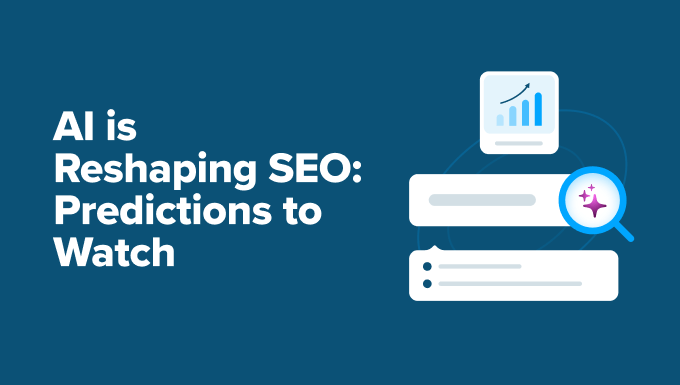
Here is a quick overview of the topics I’ll cover in this guide:
How Is AI Reshaping SEO?
In November 2022, OpenAI released ChatGPT, which has significantly altered how people search online and consume content. Unlike traditional Google Search, AI tools gave users instant answers to their questions without needing to visit multiple websites.
Recognizing this shift in user behavior, Google quickly adapted by introducing Google AI Overviews in search results. Here’s an example of how itlooks:
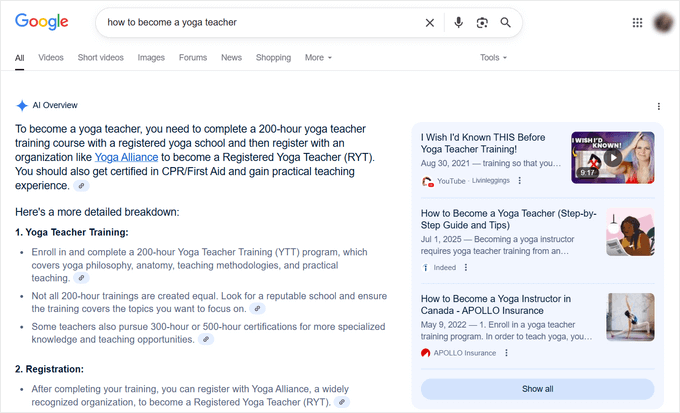

These AI-generated summaries typically appear at the top of search pages.
In fact, Google considers AI Overviews as a success, as it has actually encouraged users to search more often:
“Instead of searching less, people who use AI Overviews are actually showing an increase in their total number of searches.”
Sundar Pichai, CEO of Google
However, this has a big impact on websites. When people get the answer directly on Google, they have less reason to click on search results, which is causing a significant drop in organic traffic for many sites.
Preparing your WordPress website for this new reality is essential, so let’s dive into these AI search predictions and statistics so you know what to expect.
How Often Do AI Overviews Appear in Search?
AI Overviews (AIOs) are becoming a dominant feature, appearing in up to 47% of Google searches, according to a Botify study.


To put that in perspective, nearly half of all Google searches now show an AI-generated answer at the top.
This is a sharp rise considering the fact that it was first introduced on May 14, 2024, in the United States, and was only expanded to other countries in October 2024.
How Fast Are AI Overviews Dominating?
Since the Google March Core Update in 2025, the appearance of AI Overviews in search results has grown by a staggering 115%, according to a study by Ahrefs.


This shows how serious Google is about this feature. A 115% jump in just a few months means they are quickly changing the search experience for everyone.
To see where this change is hitting hardest, here are the industries that have spiked the most in AI Overviews since the recent rollout:
To be clear, one reason for these huge spikes is that these industries had a lower baseline to begin with. They historically triggered AI Overviews far less than topics like healthcare and education.
🔮 Prediction: What these numbers show is simple: AI Overviews are not a small test. They are quickly becoming a normal part of Google and are growing very fast.
AI Overviews are expected to show up more often from now on. For anyone with a website, this is a clear sign that you need to get ready for this new reality.
What Triggers a Google AI Overview?
AIOs are triggered by informational intent. Nearly all (99.2%) keywords that generate an AI Overview are informational in nature, rather than commercial or transactional.


This is the most important trigger to understand. It means AIOs are designed to appear when people are looking for answers and explanations, like asking ‘how to start a blog‘ or ‘what are the symptoms of the flu’.
To increase your chances of being featured in Google’s AI Overviews, you should focus on creating high-quality, authoritative content that directly answers user queries concisely and comprehensively
You can find relevant questions for your core niche by using a tool like the Free WPBeginner Keyword Generator. Its “Questions” tab shows you what people are really searching for, so you can create content that perfectly matches their needs.
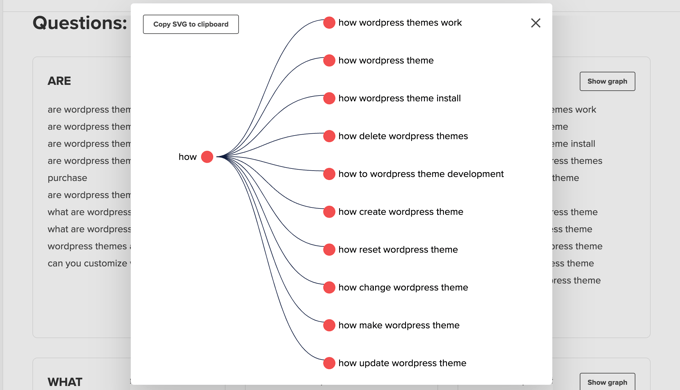

Does the Length of a Query Matter to AI?
The longer and more complex a question is, the more likely it is to receive an AI Overview. A query with eight or more words is 7 times more likely to get an AI-generated answer.


This isn’t a coincidence. It aligns perfectly with Google’s stated purpose for the feature.
In a May 2024 tweet, Google said the goal of AI Overviews is to “answer your most complex problems and help you get things done.”
Here’s a great example. Imagine you search for “3 day easy meal plan for a group”. You’ll see an AI Overview in the search results, like the one in the image below:
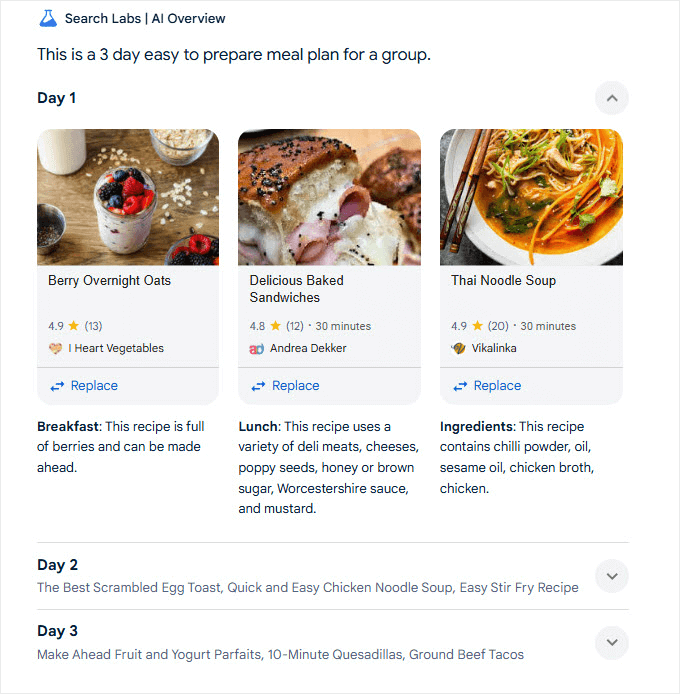

To create such a helpful and specific answer, the AI analyzes several key parts of your query at once:
Duration: 3 days
Complexity: Easy (e.g., simple recipes, minimal prep time)
Audience: A group (e.g., recipes that are scalable or serve multiple people
Outcome: A structured meal plan for the entire duration
The AI Overview then generates a complete, structured meal plan. It will often lay out suggestions for each day and meal, complete with images and links to the full recipes.
What makes this feature particularly powerful is its interactivity. If you don’t like a particular suggestion, then you can simply click the ‘Replace’ button underneath it.
This action pulls up a variety of alternative dishes that still match your original request, allowing you to tailor the plan perfectly to your group’s tastes.
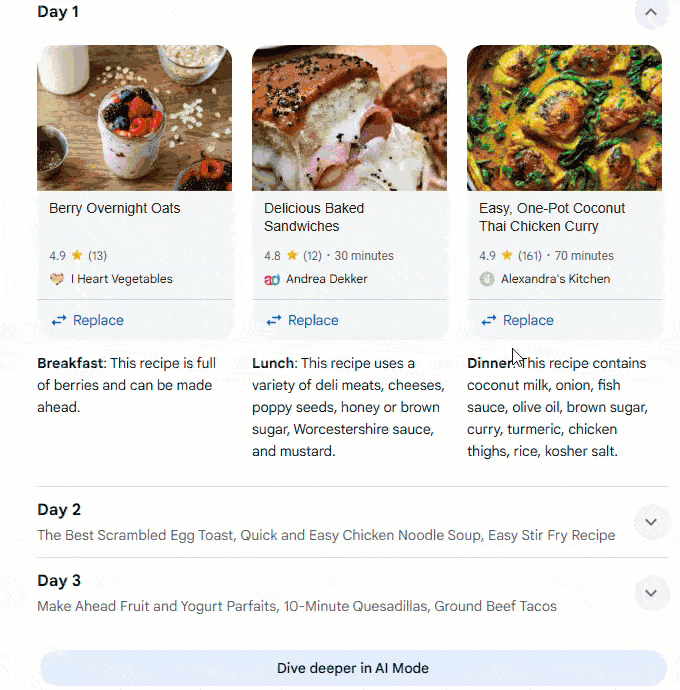

By understanding and combining all these elements, the AI provides a comprehensive answer that would have previously required multiple searches.
This is also a huge time-saver because, as a user, you can find everything you need in one place, FAST.
💡While Google introduced AI Overviews in many countries, some of these advanced layouts for AI results are currently only available in the U.S for English searches.
Where Do Most AI Overviews Appear?
They are primarily a mobile feature. A massive 81% of queries that trigger an AI Overview are performed on mobile devices.


This means that if your website isn’t optimized for mobile users, you’re missing out on the biggest opportunity to appear in AI search.
How Does Keyword Competition and Monetization Affect AI Overviews?
AI Overviews show more for search keywords that have low or medium competition (80% and 60%), and they are far less common for the most highly competitive terms (10%).


But this isn’t a simple opportunity to get featured. It’s a strategic decision tied directly to Google’s revenue.
The reality is that AI Overviews are most common for searches that don’t make Google money. Over 71% of queries that get an AI answer have no advertising cost associated with them.
This is because high-competition keywords are often highly commercial and packed with valuable ads. It seems that Google is protecting its primary revenue stream by testing AI Overviews in lower-risk, informational areas first.
How Are AI Overviews Affecting Local Queries?
Local search is less affected for now. AIOs appear less frequently for local search queries compared to general informational searches.
For local businesses, this means traditional SEO is still your best friend.
Your main goal should be to rank high in the standard search results and in the Google Maps results. Our ultimate WordPress local SEO guide has all the steps you need to get there.
How Are Branded Queries Affected by AI Search?
Branded searches are far less likely to trigger an AI Overview, showing up in only 4.79% of cases.


More importantly, when an AI summary does appear for your brand, it comes with a surprising advantage.
Research from Amsive shows these queries receive an 18.68% boost in click-through rate (CTR). This is likely because the user’s existing trust and familiarity with your brand make them more eager to click.
How Are People Using AI Tools for Search?
More than 15 million adults in the U.S. now use generative AI as their main tool for searching online. That number is expected to jump to over 36 million in the next four years.


This shows that a new user habit is forming quickly.
Millions of people already prefer getting direct answers from an AI tool like ChatGPT instead of clicking through a list of websites, and that number is growing fast.
What Platforms Are People Actually Using to Search?
Despite the rise of AI, people are still overwhelmingly turning to Google for search. Google manages about 14 billion searches daily, capturing over 93% of the market.


On the other hand, ChatGPT sees an estimated 37.5 million search-like prompts per day, equaling just 0.25% of the market share.
That’s less than Microsoft Bing (4.10%), Yahoo (1.35%), and DuckDuckGo (0.73%).
Do Users Actually Read AI Overviews?
The majority of users (86%) “skim quickly” through AI Overviews, looking for key points rather than reading every word.


This behavior is nothing new. It’s exactly how people scan blog posts, hunting for specific answers.
This leads to a surprising advantage. While you might get fewer clicks overall, the ones you do receive from AI Overviews can be incredibly valuable.
Because these users are skimming for specific information, a click signals that they believe your site has the exact answer they need. This results in high-intent visitors who are more likely to convert compared to an average user from traditional search results.
If you want to get recommendations on how to improve the on-page SEO of your content, you can use TruSEO inside the All in One SEO plugin.
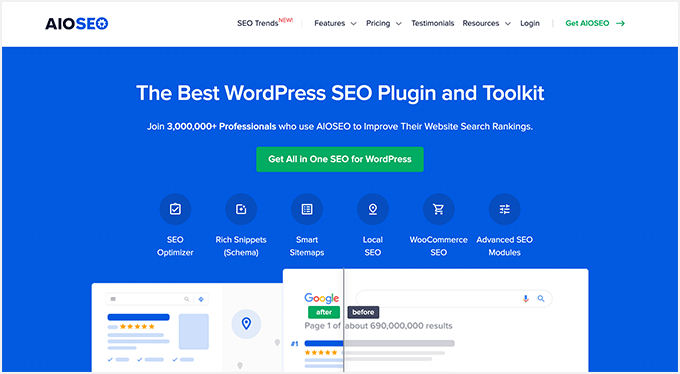

Its built-in TruSEO analysis checks your writing for things like sentence length and clarity, giving you real-time suggestions to make your content easier to understand.
There’s even a free version of All in One SEO that you can get started with.


Does Your Position Within the AI Overview Matter?
The top of the AI Overview is now the most valuable real estate in search. Not only does the feature itself take up nearly half the screen space on both desktop and mobile devices, but data also shows most users don’t look past the first third of the result.
In other words, they’re only reading about 30% of the information.


This means getting mentioned by the AI isn’t enough. Your brand must also be featured in the very first few sentences to have any real impact.
You can see a perfect example of this below, where WPForms is featured right at the top of the answer for “best contact form for wordpress.”
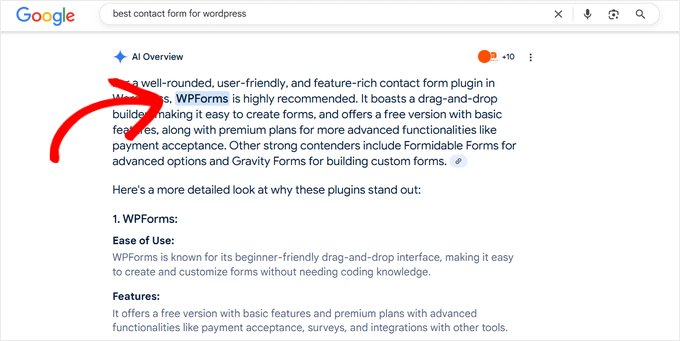

Do Users Trust Generative AI Results?
The relationship users have with generative AI is complicated. On one hand, adoption is happening fast, with 70% of consumers having at least some trust in generative AI results.


This shows that a majority of people already see it as a credible source for information.
However, a Growth Memo study found that for 38% of searches, users still felt the need to double-check the AI’s answer by opening an organic link “just to be sure,” especially for important topics like health or money.
This creates a clear split in user behavior. For simple questions, the AI answer is enough.
But for important topics, the habit of seeking a “second opinion” means that a click to your website is incredibly valuable. It signals that the user is actively looking for an authority to verify the facts.
Where are Users Clicking After an AI Overview?
When users want to verify an AI answer, they don’t just look for another article; they look for community proof.
Data from post-AI clicks shows that users are turning to platforms like Reddit (18% of clicks) and YouTube (10%) to see what real people are saying.


This behavior signals a significant shift. To succeed, you need to meet your audience where they are to build trust. Instead of just writing about your expertise, you need to prove it in public forums.
Here are some effective strategies that we’ve been using at WPBeginner and our sister sites:
By being active in these channels, you not only build brand trust but also create pathways to capture those valuable clicks from users seeking to verify AI-generated information.
How Does AI Search Affect Organic Traffic & Referral Traffic?
A powerful new traffic source is emerging for website owners. While traditional search traffic has dipped by 21%, AI referral traffic, which is clicks from chatbots like ChatGPT, Gemini, and Copilot, has skyrocketed by 10x over the last year.


The key to capturing this growing stream of visitors is to think beyond traditional rankings and focus on becoming a trusted source for AI.
To do this, you must clearly signal your credibility through E-E-A-T (Experience, Expertise, Authoritativeness, and Trustworthiness). AI models are programmed to look for these signals to ensure the information they provide is reliable.
An effective way to build these signals on your site is with All in One SEO. Its Author SEO features are designed to showcase expertise, allowing you to easily add author bio boxes with credentials.
Here’s an example of how it looks:


This sends clear proof to both users and AI models that a real expert is behind your content.
🔮 Prediction: This shift is only getting bigger. In fact, Semrush predicts that by 2028, AI search visitors will outnumber those from traditional search.
This is a clear signal that focusing on your E-E-A-T today is the best way to prepare for what’s coming.
How Does Google’s AI Mode Affect Traffic?
Beyond the automatic AI Overviews, Google’s experimental AI Mode shows an even more dramatic impact on website traffic.
A recent iPullRank study found that while 24% of traditional Google Search sessions result in a click, that number drops to just 4.5% in AI Mode.


So, what is AI Mode? Unlike the automatic Overviews, it’s a separate, opt-in search experience that users must actively select. It functions more like a chatbot, providing comprehensive answers that reduce the need to visit external websites.
However, there’s a silver lining. When users in AI Mode click a website link, their engagement is nearly identical to traditional searchers, averaging 5.9 pageviews per session.
🔮 Prediction: AI Mode gives us a glimpse into a future where clicks are rare but incredibly valuable. If this feature becomes more widespread, being the trusted source the AI cites will be critical for capturing any high-intent traffic at all.
How Does AI Search Affect Clicks?
A recent study by Ahrefs analyzed 300,000 keywords and found that when Google showed an AI Overview, the top-ranking page saw a 34.5% drop in average click-through rate compared to similar results without AI.


This statistic highlights a major shift: the value of ranking #1 is changing.
Because the AI Overview often gives a direct answer, fewer people need to click on a link. This means the top spot is now less about getting the most traffic directly and more about being chosen as a trusted source for the AI’s answer itself.
Earning a mention inside the AI Overview has become the new prize, turning your top ranking into a signal of authority for Google’s AI.
Is AI Creating More Zero-Click Searches?
It’s undeniable: clicks are steadily declining from Google Search. In the last year alone, zero-click searches have risen from 24.4% to 27.2%.


A major reason for this is Google’s strategy with AI Overviews. Nearly 44% of all AI answers source Google’s own properties, creating a powerful loop that directs users back to its own services.
This is further proven by the fact that clicks to other Google sites like Maps and YouTube have also increased to 14.3%, compared to 12.1% a year ago.
🔮 This trend is changing the value of a click for good. As more searches are resolved without leaving Google, the users who do click through to your site are signaling much stronger interest.
This is where your conversion strategy becomes super important. Tools like OptinMonster are designed for this exact moment, allowing you to present targeted offers that convert these highly interested visitors into long-term subscribers and customers.
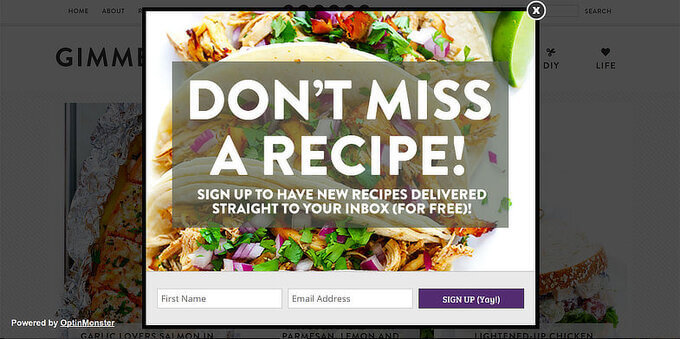

If you want more ideas, see our guide on advanced landing page tips to skyrocket WordPress conversions.
What Are the Top Ranking Factors for AI Search?
The three factors with the highest correlation to getting mentioned in an AI Overview are: Branded web mentions, branded anchor text, and branded search volume.


This is a huge change. Now, your brand’s reputation matters more than almost anything else to Google’s AI.
Think of it like this: research from Ahrefs shows that if your brand isn’t being talked about online, you’re basically invisible to AI.
New and small sites in their study averaged between zero and three mentions. At the same time, the most popular brands got a huge boost, receiving 10 times more features in AI Overviews than the next group down.
🔮 Prediction: These statistics show that SEO in the future will look more like brand marketing and public relations.
Instead of just focusing on technical SEO, the winning strategy will be to get your brand name mentioned on podcasts, in news articles, and in industry reports. Building this kind of authority across the web is what Google’s AI values most.
How Should You Structure Your Content for AI Search?
The “People Also Ask” feature appeared in 80.92% of all AI Overview query search results. Featured snippets, thumbnails, video previews, and discussions were also prominent in AIO search results.


This shows that future content will need to be structured as a series of “answer blocks.” Successful websites will break down their articles into clear, concise sections designed to answer one specific question at a time.
This makes it easy for Google to grab the text for a featured snippet, which in turn makes it a perfect source for an AI Overview.
You can make this strategy even more effective by adding schema markup, like FAQ schema for Q&As or How-to schema for tutorials.
We use the All in One SEO plugin on our own sites because it makes it easy to add different types of schema markup, without needing to touch any code.
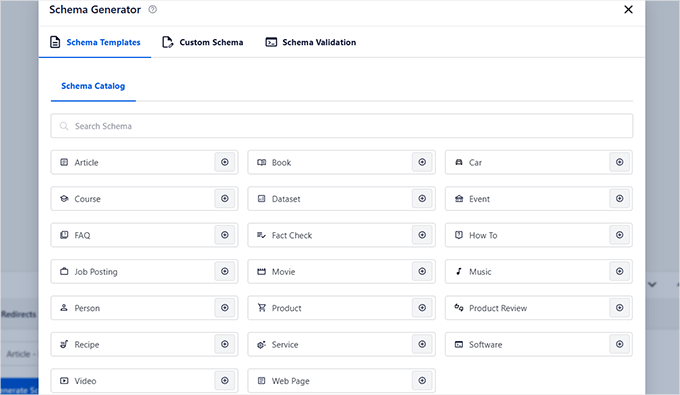

This directly signals to Google what your content is about, increasing your chances of being featured.
On WPBeginner and our partner sites, using schema consistently has really helped us show up more in AI answers.
Do Organic Rankings Still Matter for AI Search?
Yes, they absolutely do. 75% of the websites cited in AI Overviews are also found ranking in the top 12, showing that the AI trusts and uses high-ranking pages for its information.


The data tells us that a high organic ranking is the first step. Without it, your chances of being featured by the AI are extremely low.
Key Takeaways: How Can Businesses Optimize for AI Search?
I’ve covered a lot of data, but it all comes down to a few key actions.
If you’re looking for a quick checklist on what to do next, here are the most important takeaways from these AI search predictions and statistics:
✅ Focus on Brand Mentions, Not Just Backlinks: Your brand’s presence and discussion across the web are now more influential than traditional link-building metrics.
✅ Create Content that Answers Informational Questions: Shift your content strategy to focus on answering specific, long-tail questions that users are asking.
✅ Structure Your Content as “Answer Blocks”: To get noticed, structure your articles with clear headings and concise answer blocks that can be easily pulled for both featured snippets and AI Overviews. Using FAQ or How-to schema makes this even more effective.
✅ Build Your Presence on Community and Video Platforms: Being active on these platforms provides the “community proof” that both users and AI systems are looking for.
✅ Don’t Abandon Traditional SEO, It’s Your Foundation: Ranking still matters. You need a strong organic ranking to even be considered by the AI, so don’t skip out on traditional WordPress SEO.
✅ Build a Brand People Search For Directly: Building a brand that users trust and search for by name is one of the most effective strategies for the future.
Sources: Ahrefs, Search Engine Land, Gartner, Growth Memo, Statista, SparkToro, Botify, DemandSphere, Semrush, SE Ranking, iPullRank
We hope this list of AI search statistics and predictions helps you adapt your website’s SEO strategy for the changes ahead.
Looking for more interesting statistics? Check out our other research articles below:
More Statistics, Trends, and Research Articles
If you liked this article, then please subscribe to our YouTube Channel for WordPress video tutorials. You can also find us on Twitter and Facebook.

